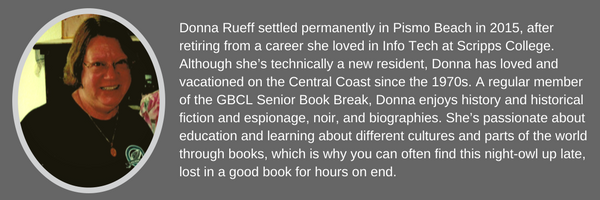by Isabel Allende (2020)
“A masterful work of historical fiction about hope, exiles, and belonging, A Long Petal of the Sea shows Isabel Allende at the height of her powers.” I cannot disagree with this assessment from the cover of this book.
Isabel Allende has been a popular writer for decades, and has even been named the most widely read South American author alive. A Long Petal of the Sea is her 20th fiction book. Her books cover a wide range of subjects for which she has received a long list of awards. Known for using magical realism, this book has no need for it: history can be more compelling than fiction.
Isabel was born in Peru while her father, a first cousin of Salvador Allende (President of Chile from 1970-1973), was a Chilean diplomat stationed at the embassy there. The family returned to Chile after her father disappeared when Isabel was very young. At various times, she also lived in Bolivia, then in exile in Venezuela to escape a death threat from the Pinochet regime in Chile. She has lived at times in other places, but now has dual Chilean-United States citizenship.
Her love of Chile and time spent in other South American countries prepared her to write this book with the first-hand knowledge that adds authenticity for the reader. Let’s face it: most North Americans are woefully ignorant about our South American neighbors and the history and character of their countries. Isabel can teach us much.
A Long Petal of the Sea (Chile as described by the famous and beloved Chilean poet Pablo Neruda) superimposes the fictional Catalonian Dalmau family and other characters against the backdrop of actual 20th century history from 1938-1994. Thinking of those dates that frame the story, the reader can be sure that there will be no shortage of upheaval.
We first meet young Victor Dalmau working as a doctor on the battlefields of Spain. By 1938, it was becoming clear that the Republicans were losing to Franco’s fascist forces. All civil wars are brutal, but the Spanish Civil War set new standards of cruelty and massive death toll. Franco’s forces were aided by Germany and Italy as a sort of practice run for WWII. Their obliteration of the town of Guernica remains famous to this day, aided in part by Picasso’s painting of the unthinkable terror and destruction experienced there.
Victor’s three years of medical school plus experience on the battlefield meant that he had skills of value wherever he went throughout his life. In that respect, he was more fortunate than many who fled Spain. Victor, his mother, and Roser, the pregnant fiancée of his dead brother, walked through the snow and mountains to France, although his mother left them before crossing the border. It was ten years before she found and reunited with Victor, Roser, and her grandchild Marcel.
In 1939, the French were not particularly welcoming to the hundreds of thousands of Spaniards flooding into their country bringing nothing but need. The rest of Europe was preoccupied with trying not to become involved in another war with Germany. The French situated most of the Spaniards in internment camps, where Victor was sent. Roser was sent to another location to have the baby. Victor was finally able to find them and arrange for them to leave France.
Here we come to the historical event that caught Isabel’s imagination decades before, and which she finally took the time to research and write this book.
The famous Chilean poet Pablo Neruda was posted to the Chilean embassy in Paris and charged with the task of helping Spaniards in the camps to immigrate. He was able to find and outfit the ship S. S. Winnipeg to transport 2200 immigrants to Chile. Victor was chosen for his medical skills, but could not bring Roser and Marcel unless they were a married couple. Roser had her own skills: she was an accomplished musician. The obvious thing to do was to marry, which they did to be able to leave Europe, with the caveat that they could divorce later.
The month-long voyage from France to Chile was tedious and crowded, but they had food and shelter on the sea. The ship arrived in Valparaiso, Chile with its cargo on September 3, 1939—2 days after Hitler invaded Poland & set WWII in motion.
The Dalmau family had a good life in Chile. Both Victor and Roser rose in their professions. However, Chile wasn’t always a safe haven—it seemed that nowhere was. It was essentially a conservative, class-conscious, religious country at that time, and while Salvador Allende came to power legally in 1970, he leaned too far to the left for the powers that be. He tried to change too much, too quickly, but stuck to his vision of what the country should and could be. As a result, he was assassinated in 1973.
Once again, Victor and his family were living in a fascist country whose leader had no qualms about arresting, torturing, and killing its citizens. Victor was again placed in an internment camp. Once again, his medical skills saved him and gained his release.
In the meantime, Roser’s skills in music enabled her to travel, most often to Venezuela. Victor joined her in living there for a time, but found that he missed the more strait-laced society of Chile. Somehow in the decades after arriving there as a refugee, Victor had become a Chilean, where he felt he belonged: ‘“My life has been a series of journeys. I’ve traveled from one side of the world to the other. I’ve been a foreigner without realizing I had deep roots.”’ [p.312] I think this applies to Isabel, too.
One of the many things that filled me with sadness in this book is Venezuela’s current condition. Isabel described it as a happy, carefree society, people who loved music, dancing, the arts, and had the wherewithal from oil sales to enjoy life with all needs met. To see what it has become is heartbreaking from the outside. I can’t even imagine how devastating it must be for those living in the nightmare that Venezuela has become, and needlessly so.
Of course, there’s much more to this story, but I leave that for the reader to discover. For myself, I was so interested by the story that I read most of the book in one sitting. The irony of people leaving one fascist regime only to find themselves in the same nightmare AGAIN in their chosen refuge tells us much about the 20th century as one of massive upheavals around the world.
“Entropy is the natural law of the universe, everything tends toward disorder, to break down, to disperse. People get lost: look how many vanished during the Retreat [from Spain]; feelings fade, and forgetfulness slips into lives like mist. It takes heroic willpower just to keep everything in place. Those are a refugee’s forebodings….” [p. 255]
I highly recommend this book to returning & new readers of Isabel Allende’s work. At the age of 78 (and newly married in 2019!), she has experienced trauma, loss, love, and finally, a perspective that comes with age. If you’re not a big fan of history, don’t worry. She doesn’t stuff it down the reader’s throat, but tells the story of the people within its context. The love she has for this project shows through the pages.
I will donate a copy of A Long Petal of the Sea to the Grover Beach Community Library.
If you wish to learn more about the Spanish Civil War, the S.S. Winnipeg, the Chilean events around Salvador Allende and Augusto Pinochet, and Isabel Allende, online searches are a good place to start. If you prefer poetry, Pablo Neruda was the popular, prolific, and beloved Nobel-winning Chilean poet whose work is easy to find in libraries and online. Isabel begins each chapter of the book with applicable lines from his work.
–Donna Rueff–

